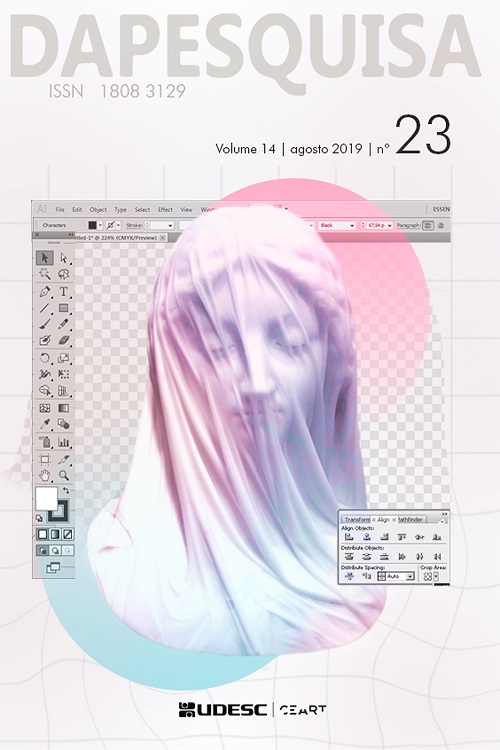Hubert Duprat: janelas do tempo, fragmentos da história
DOI:
https://doi.org/10.5965/1808312914232019142Keywords:
Hubert Duprat, Arte contemporânea, Luz, Arte medievalAbstract
Discute a obra “Sans titre” de Hubert Duprat, a qual dialoga com a história da arte no período medieval, paradoxo temporal próprio do artista que vai sempre ao passado para criar no contemporâneo e produz trabalhos que têm revisitado a história da arte. O artista trilha um caminho onde tempos múltiplos habitam seu fazer artístico, tanto nos procedimentos técnicos escolhidos, nos materiais utilizados, como na forma final de seus trabalhos. Duprat evidencia seu apreço pela história da arte, mostrando que não pretende inventar a última roda, mas reverenciar o passado histórico dar origem à arte contemporânea.
Downloads
References
BAUDRILLARD, Jean. O paroxista indiferente. Rio de Janeiro: Pazulin, 1997.
BÍBLIA. Atos dos Apóstolos, 2, 1-13. In: BÍBLIA. Português. 1981. Bíblia sagrada. 30.ed. São Paulo: Ave Maria, 1981. p. 1414-1415.
FRANÇA-HUCHET, Patrícia. Temporais: citação e colisão. In: ENCONTRO DA ANPAD. 35., 2011, Rio de Janeiro. Anais [...]. Rio de Janeiro: ANPAD, 2011. p. 4260-4275. Disponível em: http://www.anpap.org.br/anais/2011/pdf/cpa/patricia_franca_huchet.pdf. Acesso em: 23 jul. 2019.
RECHT, Roland. Le croire et le voir: l’art des cathédrales (XIIe – XVe siècle). France: Gallimard, 1999.
RODIN, Auguste. Grandes catedrais. São Paulo: Martins Fontes, 2002.
SALOMON, Marlon (org.). História, verdade e tempo. Chapecó: Argos, 2011.
VAN ACKER, J. A.. Do específico na arte. In: KISLANSKY, Israel. Blog do Kislansky. São Paulo, 27 jan. 2011. Disponível em: https://kislansky.blogspot.com/2012/01/do-especifico-da-arte.html. Acesso em: 23 jul. 2019.
Downloads
Published
How to Cite
Issue
Section
License
Copyright (c) 2019 Luciane Ruschel Nascimento Garcez

This work is licensed under a Creative Commons Attribution 4.0 International License.
Authors who publish in this journal agree to the following terms:
The authors retain the copyright and grant the journal the right of first publication, with the study being simultaneously licensed under the Creative Commons Attribution-Noncommercial License, which allows the sharing of work with acknowledgment of authorship and initial publication in this journal.
This journal, following the recommendations of the Open Access movement, provides public access to all its content, following the principle that free access to research leads to a greater global exchange of knowledge.
Plagiarism in all its forms constitutes unethical publication behavior and is unacceptable. The Journal DAPesquisa reserves the right to use software or other methods of detecting plagiarism to analyze submitted works.





